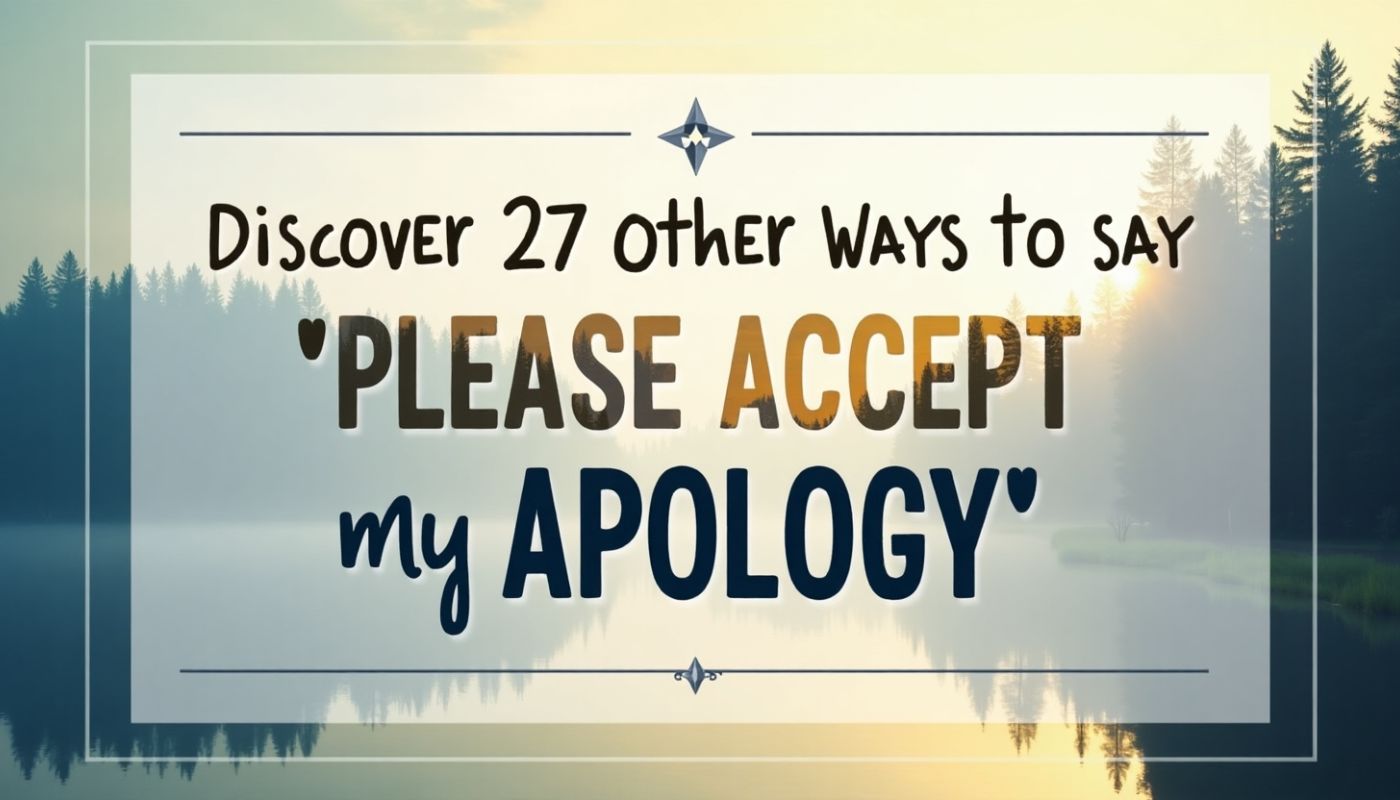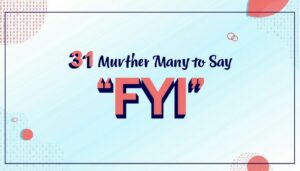Apologizing can sometimes feel like a daunting task, especially when it’s important to communicate sincerity and understanding. Whether you’re addressing a minor mistake or a significant oversight, choosing the right words can make a big difference in how your apology is received.
In this article, we’ll explore 27 different ways to express your apology, each with its own unique nuance, suitable for various situations, from casual chats to formal communication. Let’s dive in and discover how to apologize with grace and empathy!
Sincerely Apologize
This phrase conveys a deep sense of earnestness. It’s perfect for formal situations where you want to be clear that your regret is genuine.
Example: “I sincerely apologize for the confusion earlier.”
Impact: It emphasizes a heartfelt apology that leaves no room for doubt about your sincerity.
Regretful Apology
When you want to acknowledge how sorry you feel about the situation, this phrase works well. It reflects the feeling of regret while showing accountability.
Example: “I offer you a regretful apology for the inconvenience this caused.”
Impact: It’s a compassionate and respectful way to show you understand the impact of your actions.
Seeking Forgiveness
This phrase places emphasis on your request for pardon. It shows that you’re not just apologizing but also hoping to rebuild trust.
Example: “I am seeking forgiveness for my actions, and I hope we can move past this.”
Impact: It adds a sense of humility and emotional openness.
Apologize With Remorse
This expression adds depth to your apology, highlighting that you feel genuine sorrow and regret.
Example: “I apologize with deep remorse for my words earlier.”
Impact: It communicates an emotional understanding of how your actions affected others.
Requesting Pardon
A more formal way to apologize, often used in written communications or professional contexts.
Example: “I am requesting pardon for my recent mistake during the meeting.”
Impact: It conveys seriousness and respect for the other party’s perspective.
Extend Apologies
This phrase is slightly formal and can be used in both written and verbal communication. It suggests that you’re going beyond simply saying sorry to offer an explanation or understanding.
Example: “I extend my apologies for not meeting your expectations.”
Impact: It adds a considerate touch, especially in professional settings.
Offer My Regrets
Offering your regrets suggests that you acknowledge the situation and express sorrow for it. It’s slightly more formal but still approachable.
Example: “I offer my regrets for missing the deadline and the inconvenience it caused.”
Impact: It’s a way to show empathy without overemphasizing the emotional aspect.
Express Sincere Apology
This phrase highlights your genuine regret and sincerity. It’s ideal for both personal and professional settings.
Example: “I express my sincere apology for the misunderstanding.”
Impact: It demonstrates thoughtfulness and authenticity.
Convey My Apologies
A slightly formal phrase often used in written communication, such as emails or letters.
Example: “I would like to convey my apologies for the oversight.”
Impact: It gives a professional tone to your apology while still sounding considerate.
Beg Your Pardon
This phrase is a more traditional, sometimes even polite way of asking for forgiveness. It can be charmingly old-fashioned or used in slightly more formal settings.
Example: “Beg your pardon, but I didn’t mean to interrupt.”
Impact: It adds a layer of humility and formality.
Apologize Humbly
This expression highlights both your apology and your recognition that you might have wronged someone. It’s very effective in formal contexts.
Example: “I apologize humbly for my actions, and I will take steps to correct them.”
Impact: It conveys genuine humility and responsibility.
Please Accept My Apology
A straightforward and respectful way to express regret, commonly used in both formal and casual contexts.
Example: “Please accept my apology for not responding sooner.”
Impact: It’s an appropriate phrase for almost any situation and is easy to adapt depending on the tone.
Please Accept My Apology for Arriving Late
A specific variation of the previous phrase, perfect for situations where punctuality is important, and you’re acknowledging your tardiness.
Example: “Please accept my apology for arriving late to the meeting; traffic was unexpectedly heavy.”
Impact: It shows responsibility and transparency.
Please Accept My Apology Meaning
This phrase can be used to clarify the intent of your apology. It’s effective when there’s any chance of misunderstanding or confusion about your regret.
Example: “Please accept my apology; I didn’t mean to offend anyone.”
Impact: It helps clarify that your apology is coming from a place of understanding and care.
Please Accept My Apology for the Inconvenience
Common in customer service or formal situations, this phrase acknowledges that the person you’re addressing has been inconvenienced.
Example: “Please accept my apology for the inconvenience caused by the delay.”
Impact: It’s polite and professional, ensuring that the other person feels acknowledged.
Please Accept My Apology for the Delay
Ideal when responding to delays in services or deliveries, this phrase conveys respect for the other person’s time.
Example: “Please accept my apology for the delay in responding to your email.”
Impact: It reassures the recipient that you understand the value of their time.
Please Accept My Apology in a Sentence
Used when you need to apologize succinctly, this phrase is both direct and efficient.
Example: “Please accept my apology in a sentence for missing the deadline.”
Impact: It offers a clear and concise way to express regret without over-explaining.
Please Accept My Apology Meme
A more lighthearted approach, this phrase can be used in casual conversations or humorous contexts, often paired with an image or meme.
Example: “Please accept my apology meme-style for my forgetfulness!”
Impact: It can lighten the mood, especially among friends or colleagues.
Please Accept My Apology for Any Inconvenience Caused
A slightly more formal alternative, this phrase works well in customer service or professional settings where inconvenience is a factor.
Example: “Please accept my apology for any inconvenience caused by the system error.”
Impact: It shows professionalism and acknowledges that the other party’s experience was affected.
Please Accept My Apology Quotes
If you want to add a thoughtful quote to your apology, this phrase can be used as an introduction to meaningful words.
Example: “Please accept my apology, and let me share a quote by Maya Angelou: ‘We all make mistakes, but we are not our mistakes.'”
Impact: It adds depth and reflection to your apology.
Please Accept My Apologies for the Inconvenience Caused
A longer, more formal variation that’s great for addressing serious inconveniences.
Example: “Please accept my apologies for the inconvenience caused by the unexpected closure.”
Impact: It’s professional and considerate, demonstrating thoroughness in addressing the issue.
Please Accept My Apology Message
If you’re sending a formal apology via text, email, or letter, this phrase can help set the tone.
Example: “Please accept my apology message for any trouble I’ve caused.”
Impact: It keeps things formal yet direct, making your message clear.
Please Accept My Apology Letter
This phrase is often used when you want to follow up with a formal letter of apology, offering a deeper explanation or reflection.
Example: “Please accept my apology letter for the misunderstanding at the event.”
Impact: It demonstrates your willingness to take responsibility and offer an in-depth explanation.
Please Accept My Apology Email
When you’re sending an apology via email, it’s important to strike the right tone. This phrase is useful for formal or professional contexts when you want to offer a clear apology in writing.
Example: “Please accept my apology email for the oversight on the report.”
Impact: It shows that you’re acknowledging a mistake in a professional manner, ensuring the recipient understands your regret without being too informal.
Please Accept My Apology or Apologies
This phrase is a slight variation of the standard apology and works well when you want to show extra care in your expression. Using “apology or apologies” can make your message sound more polished and complete.
Example: “Please accept my apology or apologies for any confusion I may have caused.”
Impact: This option can soften the apology and make it sound more formal, which is ideal for situations where you need to ensure clarity and sincerity.
I Hope You Accept My Apology
This version is a more personal way to ask for forgiveness, acknowledging that the other person’s acceptance is important to you. It’s great for situations where you want to show a more humble and heartfelt approach.
Example: “I hope you accept my apology for being late to the meeting.”
Impact: This phrase is emotionally engaging and shows that you’re not just offering an apology but also hoping to heal any hurt caused by your actions.
Please Accept My Apology Sentence Example
If you’re providing an apology in a clear, straightforward manner—whether in a text message or a conversation—this phrase can help you directly express your regret without over-complicating things.
Example: “Please accept my apology sentence example for the error in my previous communication.”
Impact: It’s perfect when you need to keep things simple and direct, ensuring the apology is understood with minimal confusion.
Conclusion
Apologies are more than just words they are a powerful way to express remorse, rebuild relationships, and take responsibility for our actions.
The alternatives above offer a wide range of options depending on the context, whether you’re sending a quick email, offering a heartfelt apology to a friend, or addressing a formal issue at work.
By choosing the right words, you can effectively communicate your regret while also showing that you care about the other person’s feelings.
Experiment with these phrases and find the ones that resonate best with your style and the situation at hand. Your sincere effort to apologize will always be appreciated.

Mark Tony is a grammar expert with 5 years of experience, specializing in teaching English grammar, enhancing writing, reading, and speaking skills for diverse learners.









